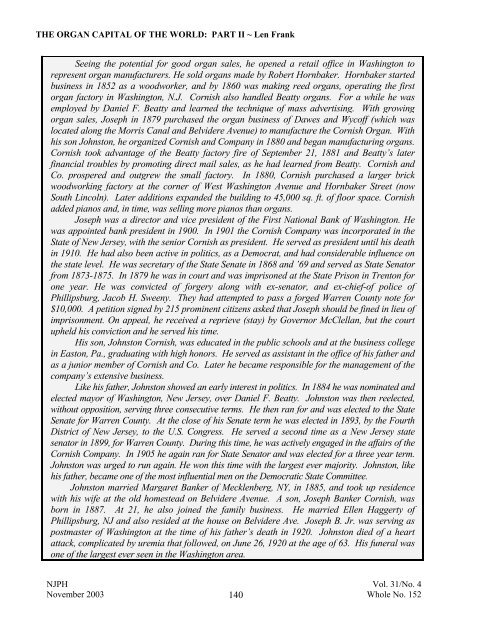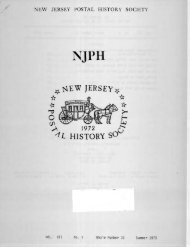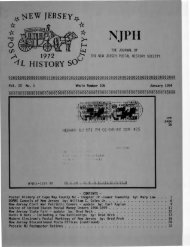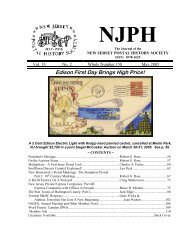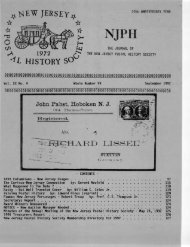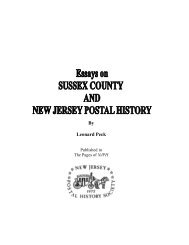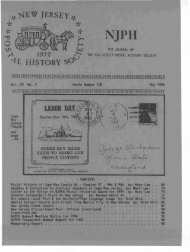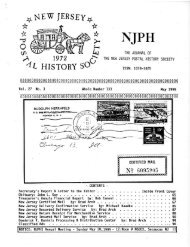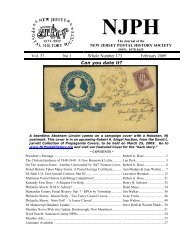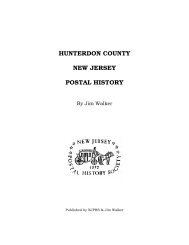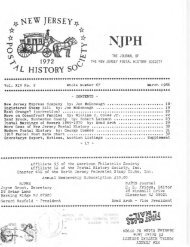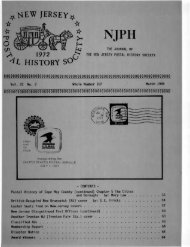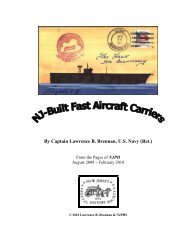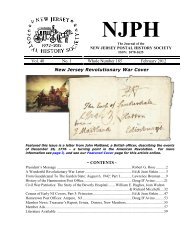Morristown, NJ - New Jersey Postal History Society
Morristown, NJ - New Jersey Postal History Society
Morristown, NJ - New Jersey Postal History Society
You also want an ePaper? Increase the reach of your titles
YUMPU automatically turns print PDFs into web optimized ePapers that Google loves.
THE ORGAN CAPITAL OF THE WORLD: PART II ~ Len Frank<br />
Seeing the potential for good organ sales, he opened a retail office in Washington to<br />
represent organ manufacturers. He sold organs made by Robert Hornbaker. Hornbaker started<br />
business in 1852 as a woodworker, and by 1860 was making reed organs, operating the first<br />
organ factory in Washington, N.J. Cornish also handled Beatty organs. For a while he was<br />
employed by Daniel F. Beatty and learned the technique of mass advertising. With growing<br />
organ sales, Joseph in 1879 purchased the organ business of Dawes and Wycoff (which was<br />
located along the Morris Canal and Belvidere Avenue) to manufacture the Cornish Organ. With<br />
his son Johnston, he organized Cornish and Company in 1880 and began manufacturing organs.<br />
Cornish took advantage of the Beatty factory fire of September 21, 1881 and Beatty’s later<br />
financial troubles by promoting direct mail sales, as he had learned from Beatty. Cornish and<br />
Co. prospered and outgrew the small factory. In 1880, Cornish purchased a larger brick<br />
woodworking factory at the corner of West Washington Avenue and Hornbaker Street (now<br />
South Lincoln). Later additions expanded the building to 45,000 sq. ft. of floor space. Cornish<br />
added pianos and, in time, was selling more pianos than organs.<br />
Joseph was a director and vice president of the First National Bank of Washington. He<br />
was appointed bank president in 1900. In 1901 the Cornish Company was incorporated in the<br />
State of <strong>New</strong> <strong>Jersey</strong>, with the senior Cornish as president. He served as president until his death<br />
in 1910. He had also been active in politics, as a Democrat, and had considerable influence on<br />
the state level. He was secretary of the State Senate in 1868 and ’69 and served as State Senator<br />
from 1873-1875. In 1879 he was in court and was imprisoned at the State Prison in Trenton for<br />
one year. He was convicted of forgery along with ex-senator, and ex-chief-of police of<br />
Phillipsburg, Jacob H. Sweeny. They had attempted to pass a forged Warren County note for<br />
$10,000. A petition signed by 215 prominent citizens asked that Joseph should be fined in lieu of<br />
imprisonment. On appeal, he received a reprieve (stay) by Governor McClellan, but the court<br />
upheld his conviction and he served his time.<br />
His son, Johnston Cornish, was educated in the public schools and at the business college<br />
in Easton, Pa., graduating with high honors. He served as assistant in the office of his father and<br />
as a junior member of Cornish and Co. Later he became responsible for the management of the<br />
company’s extensive business.<br />
Like his father, Johnston showed an early interest in politics. In 1884 he was nominated and<br />
elected mayor of Washington, <strong>New</strong> <strong>Jersey</strong>, over Daniel F. Beatty. Johnston was then reelected,<br />
without opposition, serving three consecutive terms. He then ran for and was elected to the State<br />
Senate for Warren County. At the close of his Senate term he was elected in 1893, by the Fourth<br />
District of <strong>New</strong> <strong>Jersey</strong>, to the U.S. Congress. He served a second time as a <strong>New</strong> <strong>Jersey</strong> state<br />
senator in 1899, for Warren County. During this time, he was actively engaged in the affairs of the<br />
Cornish Company. In 1905 he again ran for State Senator and was elected for a three year term.<br />
Johnston was urged to run again. He won this time with the largest ever majority. Johnston, like<br />
his father, became one of the most influential men on the Democratic State Committee.<br />
Johnston married Margaret Banker of Mecklenberg, NY, in 1885, and took up residence<br />
with his wife at the old homestead on Belvidere Avenue. A son, Joseph Banker Cornish, was<br />
born in 1887. At 21, he also joined the family business. He married Ellen Haggerty of<br />
Phillipsburg, <strong>NJ</strong> and also resided at the house on Belvidere Ave. Joseph B. Jr. was serving as<br />
postmaster of Washington at the time of his father’s death in 1920. Johnston died of a heart<br />
attack, complicated by uremia that followed, on June 26, 1920 at the age of 63. His funeral was<br />
one of the largest ever seen in the Washington area.<br />
<strong>NJ</strong>PH Vol. 31/No. 4<br />
November 2003 140<br />
Whole No. 152


